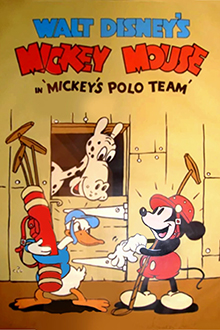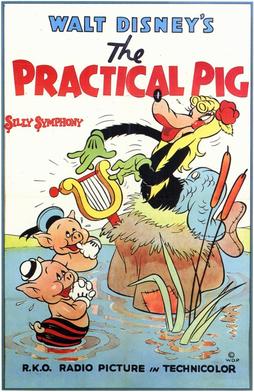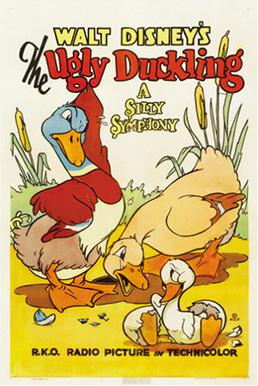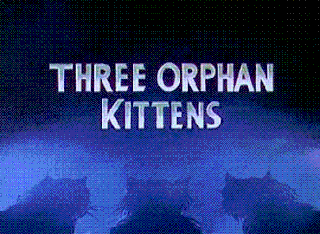
"The Three Little Pigs" is a fable about three pigs who build their houses of different materials. A Big Bad Wolf blows down the first two pigs' houses which are made of straw and sticks respectively, but is unable to destroy the third pig's house that is made of bricks. The printed versions of this fable date back to the 1840s, but the story is thought to be much older. The earliest version takes place in Dartmoor with three pixies and a fox before its best known version appears in English Fairy Tales by Joseph Jacobs in 1890, with Jacobs crediting James Halliwell-Phillipps as the source. In 1886, Halliwell-Phillipps had published his version of the story, in the fifth edition of his Nursery Rhymes of England, and it included, for the first time in print, the now-standard phrases "not by the hair of my chiny chin chin" and "I'll huff, and I'll puff, and I'll blow your house in".

The Wise Little Hen is a 1934 Walt Disney's Silly Symphony cartoon, based on the fable The Little Red Hen. The cartoon features the debut of Donald Duck, dancing to "The Sailor's Hornpipe". Donald and his friend Peter Pig try to avoid work by faking stomach aches until Mrs. Hen teaches them the value of labor.
Silly Symphony is an American animated series of 75 musical short films produced by Walt Disney Productions from 1929 to 1939. As the series name implies, the Silly Symphonies were originally intended as whimsical accompaniments to pieces of music. As such, the films usually did not feature continuing characters, unlike the Mickey Mouse shorts produced by Disney at the same time. The series is notable for its innovation with Technicolor and the multiplane motion picture camera, as well as its introduction of the character Donald Duck, who made his first appearance in the Silly Symphony cartoon The Wise Little Hen in 1934. Seven shorts won the Academy Award for Best Animated Short Film.

The Big Bad Wolf is a fictional wolf appearing in several cautionary tales, including some of Grimms' Fairy Tales. Versions of this character have appeared in numerous works, and it has become a generic archetype of a menacing predatory antagonist.

Little Red Riding Hood is a European fairy tale about a young girl and a sly wolf. Its origins can be traced back to several pre-17th-century European folk tales. The two best known versions were written by Charles Perrault and the Brothers Grimm.

Mickey's Polo Team is a 1936 American animated short film produced by Walt Disney Productions and released by United Artists. The cartoon features a game of polo played between four Disney characters, led by Mickey Mouse, and four cartoon versions of real-life movie stars. It was directed by David Hand and was first released on January 4, 1936. The film was inspired by Walt Disney's personal love of polo. It was the 80th Mickey Mouse short film to be released, and the first of that year.

Little Red Riding Rabbit is a 1944 Warner Bros. Merrie Melodies cartoon, directed by Friz Freleng, and starring Bugs Bunny. It is a sendup of the "Little Red Riding Hood" story, and is the first time in which Mel Blanc receives a voice credit.

Three Little Pigs is a 1933 animated short film released by United Artists, produced by Walt Disney and directed by Burt Gillett. Based on the fable of the same name, the Silly Symphony won the 1934 Academy Award for Best Animated Short Film. The short cost $22,000 and grossed $250,000.

Toby Tortoise Returns is an animated Technicolor cartoon in Walt Disney's Silly Symphonies series, directed by Wilfred Jackson. It is a sequel to the 1935 short The Tortoise and the Hare, and premiered on August 22, 1936.

The Practical Pig is a Silly Symphony cartoon. It was released on February 24, 1939, and was directed by Dick Rickard. It was the fourth and final cartoon starring The Three Pigs. Like its predecessors, The Practical Pig incorporates the song "Who's Afraid of the Big Bad Wolf?". Unlike its predecessors however, its title cards labeled it as a standalone Three Little Pigs cartoon, suggesting that they were to get their own series of cartoons. It is also the second-to-last Silly Symphony cartoon.

Three Little Wolves is a Silly Symphony cartoon. Released on April 18, 1936, and directed by Dave Hand. It was the third Silly Symphony cartoon starring the Three Little Pigs. It is loosely based on The Boy Who Cried Wolf. It introduces the Big Bad Wolf's sons, the Three Little Wolves, all of them just as eager for a taste of the pigs as their father.

The Little Red Riding Hood fairy tale has often been adapted, and into a wide variety of media.
The first wave of Walt Disney Treasures was released on December 4, 2001. It includes four different DVD sets.

The Ugly Duckling is an animated short film by Walt Disney, based on the 1843 fairy tale "The Ugly Duckling" by Hans Christian Andersen. The film was directed by Jack Cutting and Clyde Geronimi, and released in theaters on April 7, 1939. Music was composed by Albert Hay Malotte, who was uncredited for the film. The animated short was first distributed by RKO Radio Pictures, and was shown with Love Affair.

Redux Riding Hood is a 15-minute animated short film directed by Steve Moore and produced by Disney in 1997 that received an Oscar nomination for Best Animated Short Film.

Three Orphan Kittens is a 1935 animated short film in the Silly Symphonies series produced by Walt Disney Productions. It was the winner of the 1935 Oscar for Academy Award for Best Short Subject (Cartoons). It was followed in 1936 by a sequel, More Kittens.

Old King Cole is a Disney cartoon in the Silly Symphonies series, based on several nursery rhymes and fairy tales, including "Old King Cole". It was directed by David Hand and released on July 29, 1933.

Three Blind Mouseketeers is a Silly Symphonies cartoon based on the nursery rhyme Three Blind Mice and the 1844 novel The Three Musketeers by Alexandre Dumas. Directed by Dave Hand and Jack Cutting, it stars Billy Bletcher.

The Thrifty Pig is a four-minute educational short animated film made by Walt Disney Studios for the National Film Board of Canada. A World War II propaganda film, it was released theatrically on November 19, 1941, as part of a series of four films directed at the Canadian public to learn about war bonds. The Thrifty Pig was directed by Ford Beebe. It is also a remake of the 1933 film of the same name.
Silly Symphony is a weekly Disney comic strip that debuted on January 10, 1932, as a topper for the Mickey Mouse strip's Sunday page. The strip featured adaptations of Walt Disney's popular short film series, Silly Symphony, which released 75 cartoons from 1929 to 1939, as well as other cartoons and animated films. The comic strip outlived its parent series by six years, ending on October 7, 1945.
















